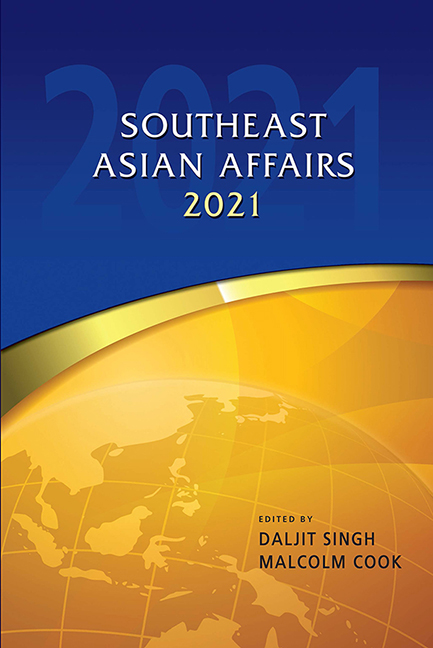One Year on, the Centrality of Politics in Malaysia’s COVID-19 Crisis
Published online by Cambridge University Press: 09 October 2021
Summary
The COVID-19 pandemic is a human tragedy on a massive scale with profound implications for the economy. Malaysia detected the first case of COVID-19 on 25 January 2020. The number of total cases remained relatively low for around one and a half months until a spike in cases occurred linked to a Tablighi Jamaat religious gathering that took place from 27 February to 1 March in Sri Petaling, a suburb of Kuala Lumpur. On 16 March 2020, the Perikatan Nasional (PN) government announced a “Movement Control Order” (MCO) to contain the spread of the virus. The financial difficulties affecting Malaysians have been generated mainly by the shutdown of economic activity from the MCO rather than from the spread of infections. As the health situation improved, the conditional MCO (CMCO) came into force on 4 May 2020, with relaxed restrictions and standard operating procedures to guide the reopening of critical sectors. The further relaxation of measures under the recovery MCO (RMCO) subsequently took effect from 10 June until 31 December. But as the year drew to a close, Malaysia was fighting a third wave of infections, which began in September 2020 with cases from Sabah, Kedah and Selangor. At the same time, Malaysia's political crisis has further compounded its health and economic challenges.
This chapter argues that Malaysia's political crisis has had both positive and negative implications for the government's fight against COVID-19. The PN government's need for popular support led to undivided attention on managing the crisis. But the good work done in the earlier months quickly unravelled as Malaysia struggled to cope with mounting cases towards the end of the year. First, the chapter will provide background on how the health crisis led to the imposition of restriction measures that then gave rise to Malaysia's economic woes. Second, it will explain why the conduct of politics has complicated how the PN government could respond to the crisis. Third, it will evaluate the government's health and economic responses to COVID-19 amid the political crisis.
COVID-19 Public Health Measures
The pandemic-related public health measures Malaysia undertook in March 2020 were initially disorganized and delayed on account of the political manoeuvrings involved in ousting the former Pakatan Harapan (PH) governing coalition—in what became known as the “Sheraton Move”.
- Type
- Chapter
- Information
- Southeast Asian Affairs 2021 , pp. 185 - 202Publisher: ISEAS–Yusof Ishak InstitutePrint publication year: 2021



